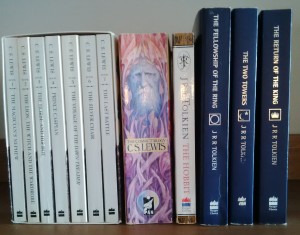“For if faith, as has been said above, is a sure persuasion of the truth of God – that it can neither lie to us, nor deceive us, nor become void – then those who have grasped this certainty assuredly expect the time to come when God will fulfill his promises, which they are persuaded cannot but be true. Accordingly, in brief, hope is nothing else than the expectation of those things which faith has believed to have been truly promised by God. Continue reading Calvin on Faith and Hope
Tag Archives: Calvin
Calvin on “The Wonderful Exchange”
I’m hoping to return to my series on Lesslie Newbigin’s marks of the missional church in the near future, but in the meantime I thought I’d share an excerpt from John Calvin’s Institutes of the Christian Religion that I came across this morning. In the soaring quote that follows we see resonances with the theme of the “blessed” or “happy exchange” which Martin Luther developed in his famous tract, “The Freedom of a Christian.” In addition, there is also a distinct echoing of the famous Patristic saying affirmed by Irenaeus, Athanasius, Gregory Nazianzus and Gregory of Nyssa, among others, that “God became man in order that man might become God.” The apparent presence of the theme of theosis or deification in this passage lends credence to the recent attempt by Rowan Williams’ to read John Calvin as “The Last of the Greek Fathers.” Continue reading Calvin on “The Wonderful Exchange”
Discipline Is Not a Dirty Word
Talk of church discipline today often brings to mind “images of witch trials, scarlet letters, public humiliations, and damning excommunications.”1 However, each of the Protestant Reformers, in their own way, recognized the importance of church discipline. John Calvin went so far as to say that the neglect of church discipline would contribute to the “ultimate dissolution of the church.”2 If Calvin could “discern frightful devastation beginning to threaten the church”3 in sixteenth century Geneva, what would he say about today’s Western Protestant Christianity, where the reigning ideal of tolerance and the omnivorous appetite of the market have combined to eviscerate the church of any remaining sense of its disciplined character? Continue reading Discipline Is Not a Dirty Word
An Interesting Juxtaposition
“I’m afraid to say, but I must say it . . . I think m uch of [C.S.] Lewis’s attraction to the Protestant evangelical world lies in his individualism.”
uch of [C.S.] Lewis’s attraction to the Protestant evangelical world lies in his individualism.”
This assessment was offered by Ralph Wood, Professor of Theology and Literature at Baylor University, in a lecture delivered in Toronto in 2004 which compared the writings and sensibilities of C.S. Lewis and J.R.R. Tolkien. I had the opportunity to re-listen to the lecture this morning. Continue reading An Interesting Juxtaposition